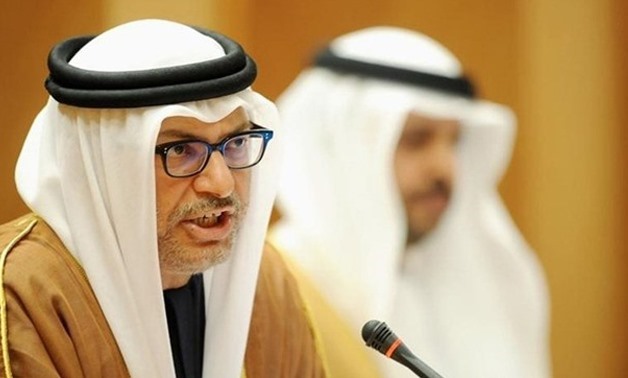
FILE - Emirati Minister of State for Foreign Affairs Anwar Mohammed Qarqash
CAIRO - 10 March 2018: In an attempt to ease the strained relations between the Arab countries and Turkey, UAE Foreign Minister Anwar Qarqash introduced how-to guide for easing Turkish-Arab rifts in the region.
“It is notable that the Arab-Turkish relations are not good. In order to get back a balance for these relations, Ankara should put the Arab sovereignty into its consideration and should deal with its neighbors wisely and rationally,” Qarqash said on his official Twitter account on Saturday.
He added that Arab countries cannot be “led by neighbors,” continuing that Saudi Arabia’s significance and pivotal role were highlighted in the success visit paid by Saudi Crown Prince Mohammed bin Salman to Britain.
Qarqash also asked Turkey to “respect Arab sovereignty” and to stop backing movements that aim to change the ruling regimes of the Arab countries, hinting at the county’s support of the ousted Muslim Brotherhood.
Recently, Turkey and the UAE went into a tit-for-tat speech between Turkish President Recep Tayyip Erdoğan and UAE Foreign Minister Sheikh Abdullah bin Zayed bin Sultan Al Nahyan over Ottoman power legacy.
In December 2017, Al Nahyan retweeted a post by a user claiming that Fahreddin Pasha, the Commander of the Ottoman Army and Governor of Medina from 1916 to 1919 and was known by defending the Medina during the First World War (WWI) against the British troops, has committed crimes against the civilians of Medina. The post also claimed that Fahreddin has stolen the people’s money and manuscripts.
Turkey saw the retweeting is a “provocative” way and an insult against the Turks. Turkish presidency spokesperson İbrahim Kalin described Nahyan’s act as “ a shame.”
In a speech to local administrators on December 20, 2017, President Erdogan sarcastically replied that “Where were your (Nahyan’s) ancestors when Faherddin Pasha was defending Medina?!”
Side in Triangle of Evils
Ankara is seen as one of a triangle of evils named by Saudi Crown Prince Mohammed bin Slaman, commonly known as MBS, said in a meeting with a number of Egyptian journalists and reporters during his three-day visit to Cairo this month.
MBS said that Turkey aims to bring the Caliphate state regime in the region via supporting and hosting organizations labelled as “terrorists” by Arab countries. Egypt, the UAE and Saudi Arabia have named the Muslim Brotherhood group a “terrorist organization” that aims to destabilise the region’s political affairs.
Turkey’s relations with Egypt have strained since the overthrowing of former President Mohamed Morsi on July 3, 2013 following mass protests called for the end of his one-year tenure. Following the protests, Ankara has denounced the ouster of Morsi and backed his group of the Brotherhood.
Despite several trials of easing the tensions between both countries since then, the dispute flared up recently, when Turkey’s Foreign Minister Mevlut Cavusoglu said in an interview in February that his country sees a maritime demarcation deal between Egypt and Cyprus “null and void”.
As per the demarcation deal, both countries allocated blocks to explore natural gas in the exclusive economic zones (EEZ) in the Mediterranean Sea in 2013. According to the delimited areas, Egypt has started to explore the natural gas in Zohr area.
In response to Turkey, Egyptian Foreign Ministry Spokesperson Ahmed Abu Zeid warned against any attempts “infringe or diminish” his country’s rights, adding that the agreement was delimited in accordance with the United Nations Convention on the Law of the Sea. The deal that was not signed by Turkey, which has announced its claims on the area delimited between Cyprus and Egypt.
Thus, UAE Foreign Minister’s comments could be another direct message to the Turkish government to change its policy in the region.

Comments
Leave a Comment